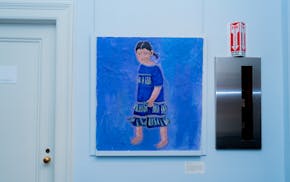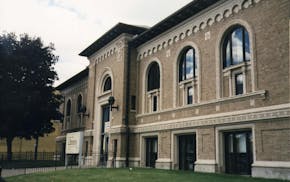To Peter Dreier, the renewed interest around Bob Dylan's life, weeks ahead of the release of the Timothée Chalamet-led biopic, "A Complete Unknown," on Christmas Day, is warranted.
"I guess I've written a lot about him," said Dreier, a political science professor at Occidental College in Los Angeles who has penned numerous articles about Dylan's cultural impact.
But while Dylan's catalog led to his 1988 induction into the Rock & Roll Hall of Fame, his activism in political causes, including the Civil Rights Movement, is inextricably linked to his legacy, too, Dreier said.
"Bob Dylan songs are not sing-along songs when he's up on stage, even now," Dreier said. "But particularly back then, before he went electric and [when] he was playing an acoustic guitar, and he was up on stage in the various coffeehouses and folk clubs in Greenwich Village and then other places when he got more famous, he was a performer.
"He wanted you to listen to the words of a song. And he had this genius for finding things in the news and introducing the tragedies and the triumphs of the Civil Rights Movement into music that people could identify with as part of the struggle, because the Civil Rights Movement was a singing movement."
In Milwaukee in the 1980s and 1990s, I'd heard Dylan's name, but his style never appealed to a kid who cared a lot more about Public Enemy, LL Cool J, Tupac and the Red Hot Chili Peppers. But then, I saw a video in a class about the March on Washington in 1963 in Washington, D.C., where Martin Luther King Jr. delivered his "I Have a Dream" speech to a crowd of 250,000 that had gathered at the Lincoln Memorial.
Before King spoke, a series of speakers approached the dais. Then, Dylan was introduced.
And I had one thought: "Who is the white guy with the guitar?" Dylan clearly stood out. On that stage, in that setting, for that moment, I figured he had done something profound to earn the respect and admiration of some of the most influential Black people in this nation's history.
He then sang, "Only a Pawn in Their Game," a song about Medgar Evers, the NAACP's field secretary in Mississippi who was gunned down in his driveway in 1963. His song had lyrics that criticized the Jim Crow South of my father's childhood. The message in the song was that the shooter did not act alone because the racism and hatred were widespread.
"A bullet from the back of a bush took Medgar Evers' blood/A finger fired the trigger to his name/A handle hid out in the dark/A hand set the spark/Two eyes took the aim/Behind a man's brain/But he can't be blamed/He's only a pawn in their game."
That's when I learned about Dylan.
There were other meaningful songs, too. In "Blowin' in the Wind," another protest song, he said, "And how many years can some people exist/Before they're allowed to be free?" He also wrote "The Death of Emmett Till" and "Hurricane," about Rubin "Hurricane" Carter, a boxing champion who was falsely imprisoned for murder.
I couldn't fathom how or why a twentysomething singer from Hibbing, Minn., who'd left the Midwest to pursue his musical dreams in New York City would lend his voice to the antiwar movement and the plight of Black and brown folks in America. But I applauded his choice as I learned more about Dylan.
In that era, Black singers had been banned from the radio and concert halls for lyrics that demanded change and an acknowledgment of their collective plight. Dreier said Dylan did not face the same bodily consequences, yet it was still a gamble for him.
"Others took real risks to their physical well-being, but Bob Dylan took commercial risks, took financial risks at first, and once he became famous, his music became iconic for us now for several generations," Dreier said.
At the most crucial juncture of his young career, Dylan spoke on behalf of the poor and the oppressed. Instead of making jingles for radio play, he picked a calling that did not promise the same commercial success. And I hope that's part of the dialogue — and the script in the new biopic — about Dylan in the weeks and months ahead.
Dylan soon left that protest song chapter behind and became the rock star he'd always wanted to be. But that portion of his career impacted his legacy.
In Netflix's "The Greatest Night in Pop," a documentary about the creation of the "We Are the World" anthem, Dylan is shown as he's grappling with the song. The quirky songwriter did not seem to fit with the stars in the room and their powerful vocals. But then, Stevie Wonder sat at a piano and sang Dylan's part for him. But he did it with an imitation of Dylan's voice. One of the greatest performers in the history of music — along with a multitude of his peers — respected Dylan that way.
And I hope the upcoming movie tells that part of his story.
"He's basically retreated from politics for the last 50 years or more," Dreier said. "But the songs live on. They live on."

Medcalf: This summer, let's all be more vigilant about our children — and everyone else's

Medcalf: Mia program provides safe space for young people to create

Medcalf: George Floyd's daughter, now 11, on life without her dad: 'It's hard'


